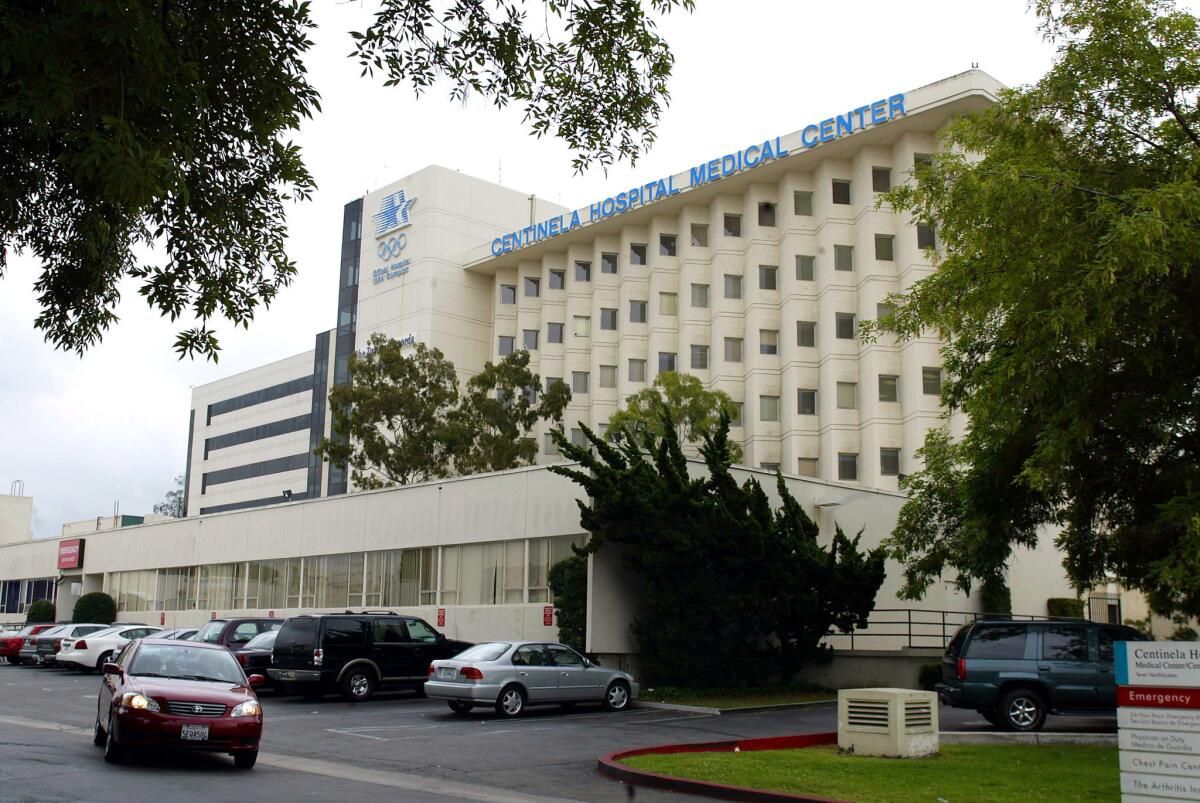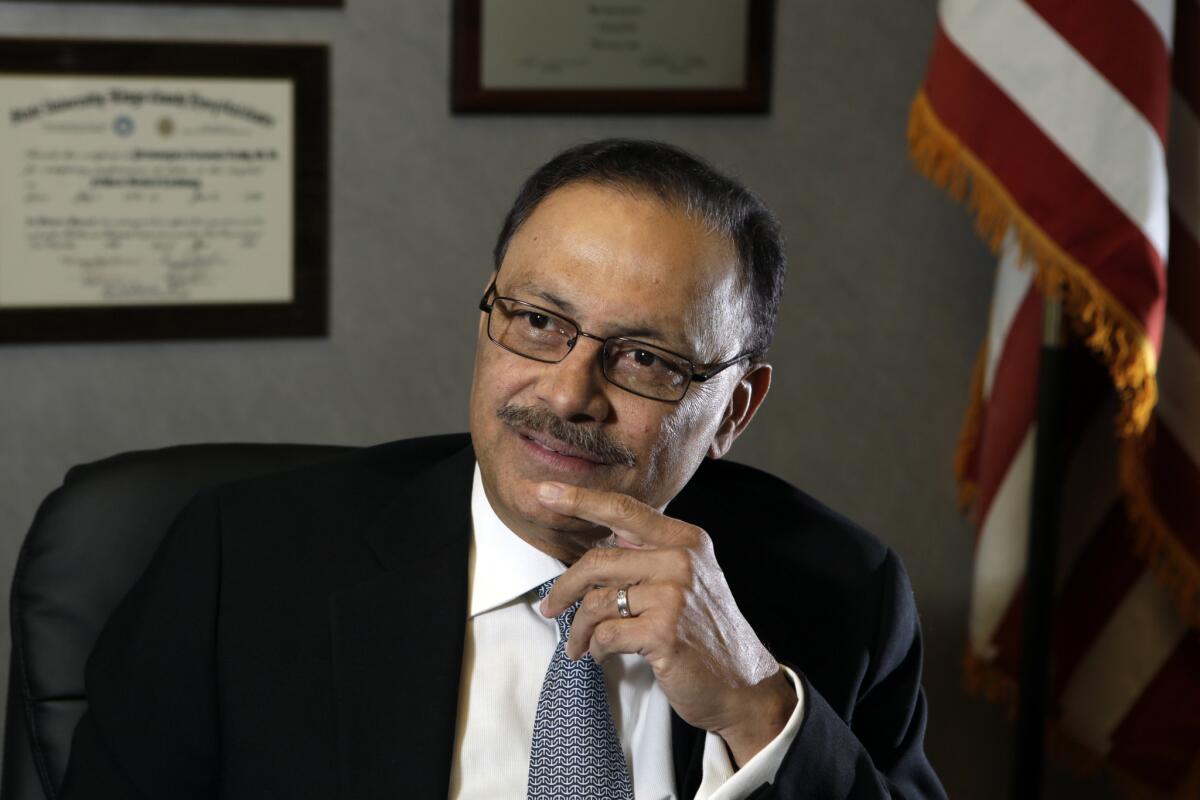Justice Department accuses Ontario-based hospital chain of cheating Medicare system

The U.S. Justice Department has joined a whistle-blower case against Prime Healthcare Services, adding significant weight to allegations of widespread Medicare overbilling at 14 of the company’s hospitals in California.
A Los Angeles magistrate judge granted the agency’s request to intervene in the case Tuesday, one day after the government declared in a court filing that its investigation of the Ontario- hospital operator has “yielded sufficient evidence” that the facilities “submitted or caused the submission of claims to Medicare for unnecessary inpatient stays.”
Prime finds itself under federal scrutiny because of a whistle-blower complaint submitted in 2011 by Karin Berntsen, a registered nurse and director of quality and risk management at Alvarado Hospital in San Diego. Berntsen’s lawsuit accuses Prime of routinely making Medicare patients’ illnesses seem more severe than they really were in order to justify billing for additional services and increasing hospital admissions.
See the most-read stories this hour >>
Berntsen alleged that this practice occurred not only at Alvarado but also at 13 other Prime properties. Most of these hospitals are in Southern California, including Centinela Hospital Medical Center in Inglewood, Encino Hospital Medical Center, Sherman Oaks Hospital and Huntington Beach Hospital.
Berntsen’s litigation estimates the total amount of overbilling at $50 million, an amount that now could result in a significant financial payoff for her — and potentially large damages against the company.
Anti-fraud statutes allow fines of $5,500 to $11,000 — plus triple damages under certain circumstances — for each false or inaccurate bill submitted by hospitals and other healthcare companies. Whistle-blowers are entitled to 15% to 25% of the money recovered in cases involving the Justice Department.
In 2012, for example, pharmaceutical giant GlaxoSmithKline agreed to pay $2 billion to the federal government to resolve accusations that it overbilled for the prescription drugs Paxil, Wellbutrin and Avandia. In 2006, Tenet Healthcare was crippled after paying $900 million in a case involving alleged Medicare bill-padding, kickbacks and changing of billing codes to obtain higher reimbursements.
Prime has denied Berntsen’s allegations, calling them “speculative nonsense” after her complaint was unsealed in 2013.
In a new statement issued after the federal government’s intervention, the company was a bit more subdued. It said Medicare billing is complex and that there is a “lack of clarity between what federal regulators and physicians believe is necessary to adequately document medical necessity for hospital admissions.”
Prime also said its hospitals have successfully undergone Medicare billing audits conducted by an array of organizations, including the Joint Commission, the Healthcare Facilities Accreditation Program, the California Department of Public Health and government “recovery audit” contractors who are rewarded for spotting billing irregularities. The company currently owns 43 hospitals across 14 states.
“Over 600 medical records that were appealed to the Administrative Law Judges and Medicare Appeals Council, all had rulings in Prime Healthcare’s favor, with no exception,” Prime’s statement said. “Given this precedence of successful appeals on thousands of claims, Prime Healthcare is confident it will prevail and ultimately be exonerated.”
NEWSLETTER: Get the day’s top headlines from Times Editor Davan Maharaj >>

But the Justice Department in a wide-ranging investigation referenced in its court filing this week cited “multiple witnesses who have worked at different Prime hospitals” who told the government that Dr. Prem Reddy, Prime’s chairman, president and chief executive, criticized emergency department physicians and demanded “their termination if he decided they were passing up opportunities to cause the admission of Medicare beneficiaries.”
The agency said those witnesses also accused Reddy of requesting “increased work schedules for [emergency department] doctors whose patients had a relatively high rate of admission,” of decreasing or discontinuing such shifts for physicians with low rates and of telling emergency department doctors “to find a way to admit all patients over 65 because they all have insurance.”
In contrast, the government said, Reddy allegedly worked to minimize hospital stays for uninsured patients — instructing that they should stay in the emergency department for only six to eight hours to get test results and then be discharged.
The Justice Department also cited the results of a Medicare contractor’s review of the company’s hospital admissions that “put Prime on notice of the same pattern of seemingly unnecessary inpatient admissions.”
Kathleen Clark, a Washington attorney who is an expert on the False Claims Act that governs whistle-blower cases, said the government’s involvement raises the stakes, given that federal regulators participate in only about one-quarter of such cases.
“It is actually quite significant when the government decides to intervene in one of these cases. The government brings to bear significant investigatory resources and leverage,” Clark said. “Intervention is seen not as a guarantee of a win, but it’s a very good sign for the whistle-blower and [his or her] lawyers.”
Marlan Wilbanks, an Atlanta attorney who is one of several lawyers representing Berntsen, said the government’s involvement could turn up additional evidence in the case disproving Prime’s assertion that previous audits proved the company’s billing practices are sound.
“Those entities were not designated to look for fraud,” he said. “Prime was given the benefit of the doubt. However, those entities did not have the evidence and the documents that the government and [Berntsen’s party] now possess.”
It’s unclear how long the legal discovery phase might take, especially because the Justice Department’s intervention will likely spur a series of procedural adjustments in the case, which is being fast tracked before Magistrate Judge Patrick J. Walsh.
paul.sisson@sduniontribune.com
Twitter: @paulsisson
ALSO
SeaWorld attendance sinks while other theme parks rise in 2015
First 365 by Whole Foods opens in Silver Lake. See how the prices compare
Another investor criticizes Tribune’s moves, but a 2nd proxy advisor backs its board






